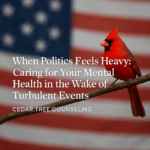

Living Inside Your Head: Is It a Mental Illness?
- Counseling, Therapy
- October 13, 2023
Living Inside Your Head: Is It a Mental Illness? The Crucial Role of Therapists in Understanding and Coping
Have you ever found yourself lost in thought, constantly preoccupied with your inner world? Many of us do, and it’s entirely normal. But what happens when living inside your head becomes a persistent, distressing, and all-consuming experience? Is it a mental illness? In this blog post, we will explore the concept of constantly living inside your head, whether it constitutes a mental illness, and the invaluable role therapists play in helping individuals navigate this intricate terrain of their minds.
Understanding Constant Intrusive Thoughts
Living Inside Your Head Defined: Constantly living inside your head often involves a state of overthinking, rumination, or being preoccupied with one’s thoughts to the point of distraction or distress. It can manifest as persistent worry, anxiety, or the inability to “switch off” one’s inner monologue.
Is It a Mental Illness? Living inside your head is not inherently a mental illness. Instead, it can be a symptom or manifestation of various mental health conditions. Some key considerations include:
- Generalized Anxiety Disorder (GAD): GAD is characterized by excessive worry and anxiety about various aspects of life. Individuals with GAD may find it challenging to control their thoughts, leading to a constant state of mental preoccupation.
- (American Psychiatric Association, “What Is Generalized Anxiety Disorder?” 2021)
- Obsessive-Compulsive Disorder (OCD): OCD involves intrusive, unwanted thoughts (obsessions) and repetitive behaviors (compulsions) aimed at reducing anxiety. Intrusive thoughts can lead to compulsive mental rituals, contributing to living inside one’s head.
- (National Institute of Mental Health, “Obsessive-Compulsive Disorder,” 2020)
- Depression: People with depression often experience rumination, dwelling on negative thoughts and feelings. This can lead to living inside one’s head, with a constant focus on distressing emotions.
- (National Institute of Mental Health, “Depression,” 2021)
The Role of Therapists in Addressing Intrusive Thoughts
- Assessment and Diagnosis: Therapists, particularly clinical psychologists and licensed counselors, are skilled at evaluating individuals experiencing intrusive thoughts. They use various assessment tools and techniques to diagnose underlying mental health conditions.
- Cognitive-Behavioral Therapy (CBT): CBT is a widely used therapeutic approach that helps individuals recognize and challenge negative thought patterns. Therapists teach coping strategies to manage intrusive thoughts and replace them with more constructive thinking.
- (American Psychological Association, “Cognitive-Behavioral Therapy,” 2021)
- Mindfulness and Meditation: Therapists often incorporate mindfulness techniques into therapy to help individuals gain better control over their thoughts. Mindfulness practices can reduce rumination and promote a more balanced mental state.
- (Mayo Clinic, “Mindfulness exercises,” 2021)
- Medication Management: In cases where intrusive thoughts are severe and significantly impact daily functioning, therapists may collaborate with psychiatrists to explore medication options.
- Support and Validation: Therapists provide a safe, non-judgmental space for individuals to express their thoughts and emotions. They offer guidance and support, validating the individual’s experiences while working together to develop coping strategies.
Conclusion
Constantly living inside your head, while not a mental illness in itself, can be indicative of underlying mental health conditions. The journey to understanding and managing intrusive thoughts often involves the expertise of therapists, who play a crucial role in assessment, diagnosis, and treatment. Whether through cognitive-behavioral therapy, mindfulness practices, or other therapeutic modalities, therapists empower individuals to gain control over their thoughts, reduce distress, and achieve mental well-being. Remember, seeking help from a therapist is a positive step toward gaining a deeper understanding of your mental landscape and improving your overall quality of life. If you or a loved one are suffering from a mental ailment, contact an experienced mental health specialist in Tulsa, Oklahoma.
References:
- American Psychiatric Association. (2021). What Is Generalized Anxiety Disorder? Retrieved from https://www.psychiatry.org/patients-families/anxiety-disorders/what-are-anxiety-disorders
- National Institute of Mental Health. (2020). Obsessive-Compulsive Disorder. Retrieved from https://www.nimh.nih.gov/health/topics/obsessive-compulsive-disorder-ocd/index.shtml
- National Institute of Mental Health. (2021). Depression. Retrieved from https://www.nimh.nih.gov/health/topics/depression/index.shtml
- American Psychological Association. (2021). Cognitive-Behavioral Therapy. Retrieved from https://www.apa.org/ptsd-guideline/patients-and-families/cognitive-behavioral
- Mayo Clinic. (2021). Mindfulness Exercises. Retrieved from https://www.mayoclinic.org/healthy-lifestyle/consumer-health/in-depth/mindfulness-exercises/art-20046356
